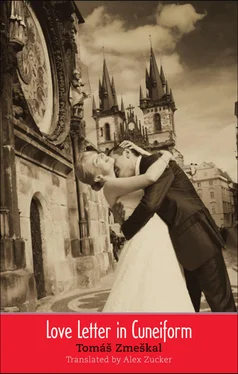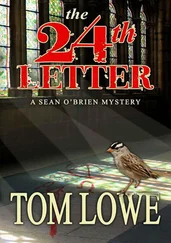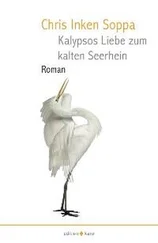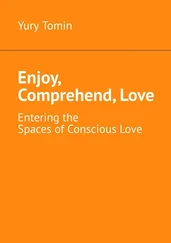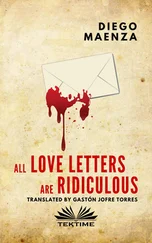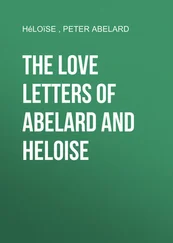The funeral was a few days after Three Kings’ Day, and although it had been a tame winter up to then, a few days before the ceremony a genuine East European winter set in. It isn’t history or politics or philosophy that divides Eastern Europe from Western, Jiří mused. It’s much simpler than that. What it boils down to is what kind of winter they have. The difference between London and Prague was more than thirty-five degrees. It was so cold everyone assumed that Aunt Anna would stay at home and they would have to go to the funeral without her, but she’d made up her mind to go, and her decision was final. Jiří drove her to the crematorium, pulled into a parking space, and slowly helped her out of the car. The snow had been shoveled, but there were a few tongues of ice on the sidewalk here and there, which Aunt Anna, with Jiří holding her by the shoulders, carefully picked her way around. There were about twenty guests at the funeral. Kryštof, Libuše, Alice, Jiří, and Aunt Anna sat in the first row. After a short speech, the ceremony came to an end. The music stopped, the coffin rolled backstage on its bier, and the mourners approached to offer their condolences. Jiří stood between Alice and her aunt, and Alice was the only one who could convince Aunt Anna to sit. “Everybody’s dying, I’m the only one left,” she complained. “And now, on top of everything else, you’re stuck with me.”
A few days later, Alice made an appointment with her uncle Antonín. After an exchange of pleasantries and memories, she plucked up the courage to ask, “You must know, Uncle. What was the story between my mom and her lover, anyway?”
“You’re sure you want to hear?” Antonín asked.
“Yes, I’m sure. I want to know what really happened.”
“Well,” Antonín began, and he proceeded to tell Alice the story of the three friends. A story so clichéd it was almost embarrassing. Alice listened in amazement, shaking her head in disbelief and interrupting every now and then to ask a question. Before ending, Antonín said: “You know, it’s the most natural reaction there is. When somebody attacks someone, when they hurt them, when somebody has power over someone, the person who’s the victim tries to get along with their attacker. When you’re afraid for your loved ones — and your mother really was afraid for you and Josef — sometimes it happens that the victim establishes a relationship with the attacker. Sometimes they even fall in love. It may be irrational but it happens. It’s a reaction to help prevent more aggression on the part of the attacker. It’s been described and researched, and maybe some of the therapies that help people will eventually even make their way here to this country. But people like your mom have had to live with it all their lives. And the eroticization of pain is just one of many things that go along with it.”
“Well, that’s all well and good,” Alice said, “but the problem is it can be used as an excuse for anything. Plus there’s also the fact that she knew him before she married my dad.”
“We’re a small country,” Antonín said. “Everyone here will always know everyone else, more or less. In fact, maybe that’s what makes it worse.”
“Right, and as for her … shall we say temporary erotic preferences, nobody cares about that anymore. But she didn’t have to make my dad suffer.”
“I’m not so sure you should blame her for that.”
“But I’m really angry at her,” said Alice. “I’m furious.”
“How come?” Antonín asked.
“Because she died second. If Dad had died second, I’d probably be just as mad at him.”
Antonín shrugged. “Remember that pastry chef who made the cake for your wedding?”
“How could I not?” Alice said. “It’s the only one I’ve had so far and it wasn’t the kind of cake you forget.”
“I ran into him recently. If you can believe it, he told me he made up the whole thing.”
“What whole thing?” Alice said.
“These stories he made me suffer through. He made them all up.”
“How come?” Alice asked.
“Now that’s a story,” Antonín said. “We ran into each other on Charles Square and stood there for about two hours while he explained. I’ve got an address for him somewhere. Anyway, if you can believe it, he was with his wife, the one who so mysteriously disappeared. She lived for years somewhere in Germany, or maybe Austria. Salzburg, I think.”
“Salzburg?” said Alice.
“I think that was it. I’m not positive. Anyway, right after the revolution, Christmas of eighty-nine, she came back to him.”
“Uh-huh,” said Alice, her thoughts now clearly elsewhere.
“Listen, as long as you’re here,” Antonín said, “you think that cousin of yours could translate something into English for me?”
“Sure,” said Alice. “Why not? He doesn’t know his way around here too well, but he likes meeting new people. He’d be glad to get to know you. I’ll set it up, don’t worry. What is it you need?”
“A colleague of mine from London is going to be coming here in about a month. Sort of half private, half for a little conference I’m putting together. Actually, I don’t even know how he found out. We weren’t expecting anyone nonlocal. In return, maybe I could take your cousin somewhere outside of Prague. Like Český Krumlov, say. Give the kid a little look around the country.”
“That’d be great, Uncle, that’d be nice. I’ll let him know,” Alice said.
The two men sat in the hotel room. It was raining outside. Jiří busied himself straightening something on the bed, every now and then glancing out the window.
“It’s not going to stop,” he said after a while.
“I guess not,” Antonín said.
“So the theater’s out then.”
“Looks that way.”
“We could go to Mass,” Jiří said, watching as his companion tapped the tip of a ballpoint pen on the nightstand next to the bed.
“I haven’t gone to church in years.”
“How come?” asked Jiří. Without waiting for an answer he added: “Supposedly this church, can’t remember what it’s called, but supposedly it’s originally from the thirteenth century.”
“I don’t believe in God,” Antonín said, “and I couldn’t care less what century the church is from.” There was a moment of silence. Jiří noticed that Antonín had stopped tapping the pen on the nightstand.
“But how come? How come you don’t believe? Does it have anything to do with your being a doctor?”
“No, why would it? Although actually … no. It’s got nothing to do with it.”
“I don’t know if it’s appropriate.” Jiří paused. “Appropriate to ask, I mean.” He turned around on the bed so he could look his companion in the face.
“Well, it’s not a particularly emotional matter for me. And besides, it’s been a long time since I stopped believing. Now I believe that I don’t believe.”
“I don’t mean to pry. I just wondered,” said Jiří.
“So should we go get some food?”
“All right,” said Jiří. “But actually I always thought faith could be a help to doctors.”
“What kind of opening gambit is that?” asked the doctor. “Is that supposed to help get us through the rain?”
“What’s a gambit?”
“Oh, nothing, you chess virgin, you,” Antonín said. He stepped up to the open window and closed it part of the way. He took a bottle of brandy from his briefcase, a glass from out of the case, and gestured to Jiří to help himself. “You’re right, faith does help. Assuming you have it, that is.”
“So does it help you, or has it ever?”
“Yes, of course, certainly. When I had it, it helped. I could really use a smoke.”
Читать дальше
